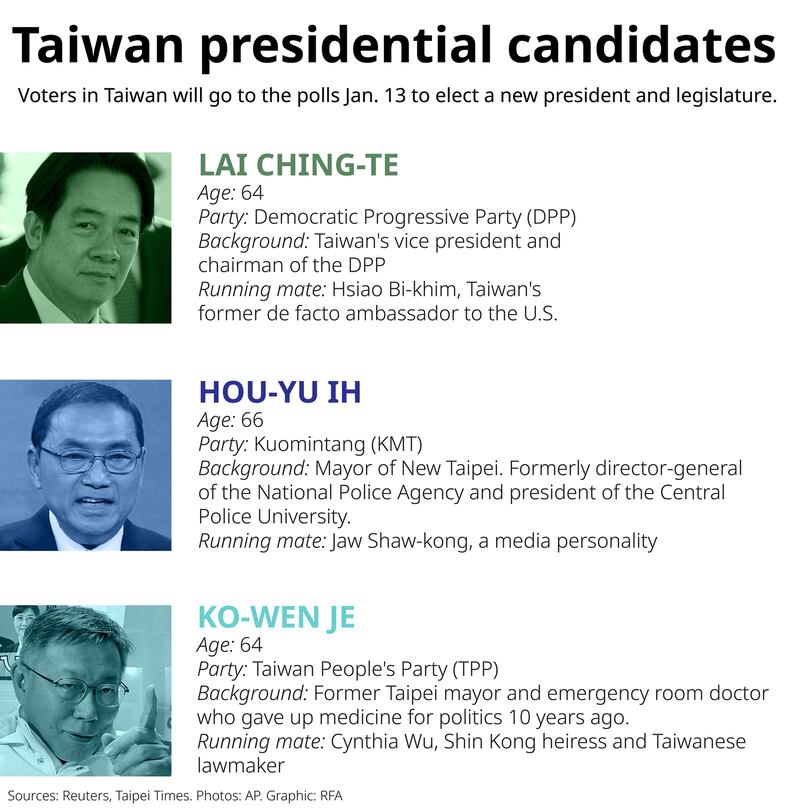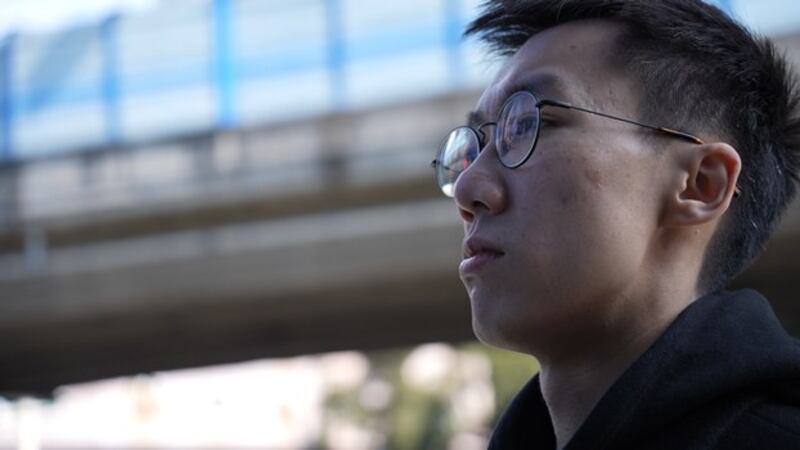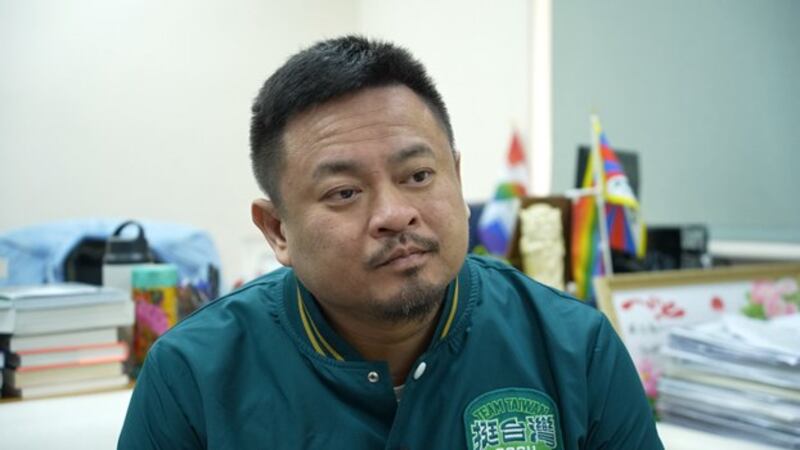Democratic Taiwan, which will go to the polls on Saturday to elect a new president and a new legislature, has been a popular destination for Hong Kongers fleeing a crackdown on dissent at home, and is currently home to more than 30,000 residents of Hong Kong and Macau, according to the government.
But as voters gear up to choose their next leaders and lawmakers, Hong Kongers living on the island told Radio Free Asia that they fear its democracy could be undermined by wrong decisions from its leaders, and an ongoing information war being waged by Beijing.
Andy, a Hong Konger who first came here as a student and now runs a restaurant in Taiwan, doesn't have voting rights in his new home, but has lived through three elections.
He said he feels more anxiety about the outcome than a lot of Taiwanese who will get to vote on Saturday, saying the island's freedoms are still at risk if the Chinese Communist Party's attempts at " reunification" aren't fended off by those in charge.

"I really regard Taiwan as my home, and I don't want Taiwan to turn into another Hong Kong," he said. "We have settled here, and don't want to have to leave again."
For Andy, the ruling Democratic Progressive Party, whose outgoing president Tsai Ing-wen has been a vocal supporter of the 2019 protest movement, seems to offer the strongest hope of a robust defense of Taiwan's way of life, although all three presidential candidates say they are committed to maintaining the status quo.
"We want to know whether the DPP will be the next government, so we can stay here with more peace of mind," he said, adding that some of his fellow Hong Kongers are wondering if it would be better to leave the island in the event of a victory for the opposition Kuomintang, which has a reputation for seeking closer ties with China.
"Judging from the news and the debates, the opposition parties are more pro-communist, but we're pretty scared of the government in [China]," he said. "Would they hand Taiwan over to China in future?"
No smooth sailing
Yet it hasn't been smooth sailing for Hong Kongers in Taiwan, even under the DPP, which has tightened immigration policy for Hong Kongers, particularly those who were born in China, making it harder to obtain residence permits for investors and professionals alike. There are also quotas and other restrictions around the hiring of Hong Kong immigrants, he said, calling for a clearer route to settlement for asylum seekers in Taiwan, which currently has no refugee law.
Asked about his policy on Hong Kong immigration, DPP presidential candidate Lai Ching-te told Radio Free Asia he would continue to support Hong Kong, if elected.
"If I am elected president, I will continue to promote concern and care for the human rights of our Hong Kong friends," he said, saying the issue had never been a problem for the DPP.
The Kuomintang responded in writing, saying that it would review existing policies and consider introducing more support measures "to help high-quality talents, including Hong Kong white-collar workers, by making it easier to settle down and start a career in Taiwan."
In response to fears that the Kuomintang would betray Taiwan, the party pledged to oppose the "one country, two systems" framework used in Hong Kong and offered to Taiwan by Beijing, adding that Taiwan's future could only be decided by its 23 million people.
Taiwan People's Party spokesperson Chen Chih-han said the party pledged to support Hong Kongers where necessary, because "freedom and democracy are basic human rights." She said that TPP presidential candidate Ko Wen-je had set up a dedicated assistance hotline for Hong Kongers during his tenure as mayor of Taipei, and criticized the immigration process under the DPP as "a roller coaster."
Strong resistance
Hong Konger Law Tze-wai said he spends a lot of time telling anyone in Taiwan who will listen not to believe anything Beijing says.

He wants to see continued strong resistance from Taipei to attempts from Beijing to soften up the population for "reunification" through propaganda, cross-straits exchanges and other peaceful means.
He also wants the next government to make life easier for Hong Kong asylum seekers.
"There is no legislation governing the current asylum policy," Law said. "It came from an executive order from the president."
"If there is a change of government, or even if [DPP candidate and incumbent vice president] Lai Ching-te takes office and becomes president, [he could decide] not to continue President Tsai Ing-wen's special arrangements for asylum."
"If that happens, around 300 refugees will have nowhere to go ... we hope they'll be able to stay in Taiwan with peace of mind."
'More careful' approach
A Hong Konger who agreed to be identified as Ms. Chu for fear of reprisals said that while the lack of clarity on immigration matters is also an issue for her, she still cares more about Taiwan's future when it comes to the election.
"The current liberal democratic system must be maintained or even improved," Chu said. "Taiwan is doing well in high-tech, but how can that position be strengthened?"

Chu dismissed the campaigns run by former New Taipei mayor and Kuomintang candidate Hou Yu-ih and former Taipei mayor and Taiwan People's Party candidate Ko Wen-je as "sloganeering," and "disappointing."
She too has a preference for the DPP, citing their "more careful" approach.
DPP lawmaker Hung Shen-han, who is running for one of the legislator-at-large seats in the island's Legislative Yuan, has been a vocal supporter of the now-suppressed Hong Kong democracy movement in past years.
He said that there are concerns that China will send people to Taiwan as infiltrators and agents provocateurs under the guise of Hong Kong asylum-seekers.
"As the Chinese Communist Party's political and socioeconomic controls of Hong Kong become more entrenched, how do we reduce the likelihood that the Chinese Communist Party will use Hong Kongers for infiltration or certain political purposes?" he said. "We have to take both things into consideration at the same time."
He agreed that more transparency is needed when it comes to the bureaucratic processes involved with residency applications from Hong Kongers.
"As a free and democratic country, Taiwan should continue to take care of Hong Kongers who share our beliefs and who embrace democracy," he said.
Translated by Luisetta Mudie . Edited by Roseanne Gerin.
